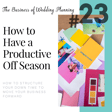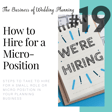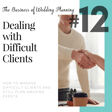Become a Creator today!Start creating today - Share your story with the world!
Start for free
00:00:00
00:00:01

The Difference Between Hiring an Employee VS Independent Contractor
Transcript
Introduction and Podcast Purpose
00:00:02
Speaker
Are you a wedding planner just starting your business or have you been in the industry for just a few years? Do you want to build a profitable and enjoyable planning business that you're excited about every day? If the answer is yes, then you're in the right place. Welcome to the business of wedding planning podcast.
00:00:21
Speaker
I'm your host, Amber Peterson. I was a wedding planner for 10 years, a marketing strategist for service-based businesses, and now the owner of Planner's Lounge. I know what it's like to work so hard as a planner but not see the growth and profit you dream of. I also know that while you can be the most talented planner in your market, if you don't have the business foundation, it will be hard to continue growing.
00:00:45
Speaker
I have seen so many talented planners burn out because they become frustrated with things unrelated to wedding planning, like finances, marketing, team growth, and operations. This is where the Business of Wedding Planning podcast and Planners Lounge come in.
Amber's Personal and Professional Journey
00:01:00
Speaker
Our mission is to help you learn what it takes to build the business of your dreams with simple digital product solutions, educational content, and the support of our free community, the Very Important Planners Lounge, or VIP Lounge for short.
00:01:15
Speaker
I understand what it's like to work in this unique industry while having a lot on your plate. During my time as a planner, I had three daughters, bought and moved to two new homes, and launched two other businesses. I am excited to combine my education, industry experience, and passion to help you reach your business goals.
Guest Introduction: Leah Weinberg
00:01:36
Speaker
Hi, friends. Welcome back to the Business of Wedding Planning podcast. Today, my guest is Leah Weinberg. She is the co-founder of Otterberg Law LLP, an attorney, a recovering wedding planner, and the author of The Wedding Roller Coaster.
00:01:53
Speaker
After nearly a decade in the wedding industry as the owner of ColourPop Events, a New York City-based wedding planning company, Leah is returning to her roots as an attorney to assist her former colleagues in the events industry along with other entrepreneurs and business owners. Her work and insights have been published a long online and in print with Vogue, The New York Times, Bravo, and Martha Stewart, among others.
00:02:16
Speaker
A wedding pro-educator with the knot and wedding wires since 2020, Leah travels throughout the country and internationally sharing insight with her peers at conferences such as the DWP Congress, BSAGE Conference, Coterie Retreat, Alt Summit, NACE Experience, and the special event. I'm so excited to share our conversation about the legalities of growing your team, so let's dive right in.
Leah's Career Transition and Expertise
00:02:43
Speaker
Welcome, Leah, to the Business of Wedding Planning podcast. I'm super excited to have you with us to talk about all of the legalities about growing a team. Yes. Thank you so much for having me today. I'm excited to chat about this. First question I ask all my guests, what has been your journey through the wedding industry? Because I know most people I talk to, it's not like graduated college became a wedding planner done. There's a lot of twists and turns.
00:03:08
Speaker
Yeah, and my story is probably particularly, I don't know if we call it unusual, but eventful. So I graduated in college, went to law school, was a lawyer for quite a while, and then decided to become a wedding
Hiring: Employee vs. Contractor Decision-Making
00:03:22
Speaker
planner. So after having a career in law, I started my planning company while still working full time as a lawyer, eventually went part time with the law.
00:03:32
Speaker
and then ended up going full time with my planning company. So I was a wedding planner here in New York City for just about 10 years before I decided to shut that down and then started a law firm with a friend of mine. So I like to say that I'm having my full circle moment because I went from lawyer to wedding planner now back to being a lawyer for wedding pros. So it's been a nice it's been a nice journey so far.
00:03:58
Speaker
Very cool. Yeah, it's so interesting that my background was in marketing and I was a marketer, then a wedding planner, then a marketer for wedding planners. And so just sort of, yeah, it's all circle. Yep, exactly. Let's jump into the questions. First, let's start by discussing just the difference between when you decide to hire, do you hire an employee, an independent contractor? What's the difference between those two things?
00:04:24
Speaker
Yeah, the I think it's important to just from the start say that you don't really you don't necessarily get to choose whether somebody is an employee or an independent contractor. It's kind of like based on the role that you are hiring them for.
00:04:40
Speaker
somebody becomes an employer and independent contractor and that there are differences so with employees comes a lot of regulations from the state and the federal government in terms of having to withhold taxes having to pay into unemployment and disability having to have workers' compensation insurance. And then on a state-by-state basis, it's also different requirements of what comes along with that in terms of documentation, like employee handbooks, certain kind of policies that you have to have for people. Sometimes it depends on how large your team is as to what kind of kicks in and when.
Legal Guidelines for Worker Classification
00:05:21
Speaker
Like, for example, in New York, depending on there's a certain threshold of employees where that would trigger you having to provide like paid leave for serving on a jury.
00:05:32
Speaker
So it really, it depends. And then with independent contractors, it is a much more free relationship that comes with a lot less restrictions. It's basically like you in a contract, you get to decide like what are the terms of your relationship, how that relationship gets to end. With an employee, most places are, it's at will employment. And so that means somebody can be high be fired, they can give notice and quit for any reason at any time. And so a lot more rules around having employees versus independent contractors. But like I said, you don't get to pick, you you don't get to just say, oh, you're an employer and independent contractor.
00:06:17
Speaker
And before we go any further, just I'm guessing, correct me if I'm wrong, that a lot of these rules are state by state. This conversation, like you would want to check with your specific state to make sure that it's not like a cross the country board type of like, here's advice for you.
00:06:34
Speaker
Yeah, so there are there are characteristics that the federal government looks at in terms of deciding if somebody is an employee or an an app independent contractor, but those really only kick in if it's a federal issue like if it's a federal issue that's being disputed. So yes, otherwise it is a state-by-state basis thing, and I know we're going to get into the specifics in a minute, but I will just say that it's very easy for folks to find what their states rules are, you can literally just Google employee versus independent contractor and put your state and then things pop up. i Make sure you're checking. You want to start with a dot .gov. You want to start with like your government website. um Sometimes there are law firms that are in specific states that kind of summarize things, but I always say like start with the actual government website so that you can see exactly what the requirements are.
00:07:27
Speaker
Okay, good advice. My next question is once you have figured out, okay, I'm hiring an employee or I'm hiring an independent contractor, what are the factors you need to really consider for either of those roles?
00:07:43
Speaker
Yeah, so this is how we kind of figure out who is who is what. And a lot of it comes so ah kind of aret like you said, it is a very state by state thing, but there are general themes of like, who is an employee, who is an independent contractor. What's really challenging, especially in the context of weddings, is that in a lot of cases, it's gonna be a gray area. And I know people don't love that. So it's kind of like, there's a little,
00:08:08
Speaker
There's a little risk taking in some of this, so it's not always completely clear, but you're going to look at things like control. So do you have control over the hours that they work? Do you have control over the location that they work? I remember when I was hiring an admin during when I had a planning business,
00:08:27
Speaker
my I was chatting with my accountant about it because ideally I wanted this person to like come work out of my apartment a couple of days a week and my accountant was like, the second she steps foot in your home to like work in an office setting, she's going to be an employee. So the location of where somebody is performing services. So if somebody is coming into an office with you, that's going to cut very heavily in favor of them being an employee.
00:08:53
Speaker
um Other things that states look at is, does the person have their own business? So are you essentially hiring their business to perform a service for you as opposed to them as an individual?
Consequences of Misclassification
00:09:05
Speaker
Some states look at things like how long of a relationship it's going to be. Is it like a one-off project thing? Is it an ongoing relationship?
00:09:14
Speaker
Reigning comes into it as well. So if somebody already has a specialized skill and they're bringing that to the table with you, that weighs more in favor of independent contractor. If you have formal training for them, that's going to cut in favor of them being an employee. And then the big one, and there are certain states that have this. I know off the top of my head, Florida is one, Illinois is one.
00:09:39
Speaker
But if the person is performing the same service that the business itself performs, that way is heavily in favor of employee status. So like let's say you're a wedding planner in those states. If you hire somebody to build a website for you,
00:09:54
Speaker
that your business isn't building websites, your business is wedding planning. So most likely that person building a website for you is going to be an independent contractor. But when you hire an assistant or associate planner, that is the business that you do. So that cuts in favor of those folks being employees. So it's really a balancing thing. So it is very important to take a look at what your state's criteria is, and then chat with a lawyer in your state if you if there's any confusion. Which there probably will be. Yeah, absolutely. I read i remember, and i I know a lot of brand like brand new, like newish planners, there's, I think, unfortunately, one of the ways people are like, oh, I'll just look something up online. I don't need to talk to a lawyer. And it's like, no, invest in that. That's so important long term.
00:10:45
Speaker
What if you get the classification wrong? Like, let's say you're like, okay, I know it's an independent contractor relationship, I'm going to hire an associate planner, and that's incorrect. What are the consequences of that? Yeah, the consequences can be very costly. I've heard anecdotally somebody who hired had somebody classified as an independent contractor that person was injured um filed a claim the state ultimately said no they should have been an employee and so it became a workers compensation issue and they ended up having to pay like fifty thousand dollars because of
00:11:22
Speaker
what had happened. My favorite story. Oh, I should have also started out our
Triggers for Audits and Legal Consultation
00:11:28
Speaker
conversation with this. If there is anybody listening from California, California is like its whole own little planet, like solar system when it comes to just legal stuff in general, but especially when it comes to employees and independent contractors, because they've probably passed the most strict law in terms of people You know, as a broad stroke, I will say like it's almost like there's a presumption that somebody is an employee unless you can actually prove that they are an independent contractor. So California is its whole a whole other area. So like a lot of what I'm saying probably doesn't apply to a lot of people in California. So I should note that. But my favorite story.
00:12:07
Speaker
is a California story. So there was um like a marketing agency that was doing a photo shoot and they hired a model for the photo shoot and had a contract and it was for like eight hours, one day thing. You know, let's say the contract was like $30,000.
00:12:22
Speaker
Well, it turns out the agency didn't pay the model on time. So the model or the model or her agency filed with the state. The state decided she should have been an employee and not an independent contractor because they were telling her like where to be. You know, like there was just so much control over the situation.
00:12:41
Speaker
And because they didn't pay her on time, which is a no-no, um they got hit with pet. They went to court and the penalties they got hit with the court costs, attorneys fees, all of that ballooned to over $300,000 that they were liable. So like what was originally a $30,000 gig turned into a $300,000 expense because the person should have been an employee and they didn't pay them on time. So like there's two lessons there. Number one, get the classification right, but also pay people on time. Oh my gosh, that is a nightmare. So yeah, it there are consequences. And yeah, you'll get hit with, um I have a friend who's a DJ and she's been audited twice for her employee independent contractor classifications. And so you do get hit with like fines and penalties too, if you get it wrong. Cause like theoretically you should have been paying into
00:13:35
Speaker
Things like disability and unemployment and having workers cop insurance for the entire time that they've been working for you So it really is a meaningful classification um so folks like and I it is so complicated because I get it like even when I was a planner, you know, I had somebody who worked with me day of They maybe worked with me like five times a year. And so it's really hard with that sort of level of it in frequency. And they had a full time job, all of that stuff. And so it's really this industry makes it kind of really tricky to
00:14:12
Speaker
do that classification because so many times people are like, well, they're, you know, they're only on site with me 10 times a year. And so it feels really strange to have to classify them as an employee. But then when you're starting to look at that specific role of like, well, I'm telling them where to show up. I'm telling them where to be. I'm over if they're an assistant, it's like I'm overseeing their work. I'm telling them how to dress.
00:14:36
Speaker
I'm setting forth, like they're working within the standards of like my business, you know they're providing the same service that like our business provides. like All of that really looks very employee-ish in a lot of cases.
00:14:51
Speaker
So you mentioned you had a friend that's been audited. What can, and I mean, just the word audit, like when you hear that, it dredges up like horror, but what can trigger that? Like if you've mentioned the someone making a claim or someone not getting paid, is there just other things that people should be aware of where it's like, you can't just fly under the radar? Yeah, the biggest thing, that the most common when I talk to people who have been audited, the most common trigger for that is somebody filing for unemployment. And so that often happens when you have somebody who doesn't necessarily understand the distinction between independent contractor and employee, and so then the work stops and they file a claim for unemployment.
00:15:35
Speaker
And then, at least in New York, the way that process works is like if somebody files that against you, you get a notice from the state that's like, hey, this person has why you know this person has said that they you know were terminated. They think they qualify for unemployment. It's now on you to say, oh, this this is why this person should be an independent contractor and essentially to kind of prove that.
00:16:00
Speaker
So that is where how it comes up and I've heard that story from a lot of different folks is like it tends to be the unemployment thing, but also the getting injured on the job thing. So if they file, I don't know ah if you have experienced this, but I always know like if I go to a doctor and I'm doing that like pre-visit questionnaire, there's always that question of did you get injured on the job?
00:16:23
Speaker
And I feel like people don't always like put two and two together what that's really trying to get at because that is your in like that's sort of also your insurance company wanting to know, oh, did this happen on the job? Should this ultimately get covered by your employer's workers comp? So that is another thing that happens.
00:16:43
Speaker
So, yeah, it is it's tough. And it's kind of like just, you know, like I said, because sometimes the distinction is unclear, it's kind of like rolling the dice in terms of, you know, is there going to be something that's going to make the state take a closer look at this? the So just to reiterate, this is a great reason to talk to a lawyer.
00:17:04
Speaker
you because of it. And I think, I mean, I know when I was a wedding planner, I got into wedding planning because I loved like planning events. I am not a lawyer. I like just reading, the like applying for my business license like made my eyes glaze over because I'm like, it's like government websites are heavy and they're not usually made for like ease of use. So if you're not in that mindset, but that is why it is important to talk to a professional.
00:17:31
Speaker
Yeah. and then so the And the two things too that I also want to just mention on top of that, like number one, um because I do get this question a lot, they're like, oh, well, i if I have somebody sign an independent contractor agreement, doesn't that make them an independent contractor? And I kind of alluded to that at the beginning, like, no, you're not you don't get to make that decision. And I will say in some states,
00:17:53
Speaker
it is a consideration of what the parties thought they were entering into. So like if both sides did agree, this is an independent contractor relationship, in some states that gets taken into account. I mean, you can see how confusing this gets because it's like, there are all of these factors of like, what what are we doing? So um yeah, just wanting to point out, because I do get that question a lot of if Well, if I have an independent contractor agreement, doesn't that make them an independent contractor? And that is not always the case.
00:18:24
Speaker
Okay. My last question is sort of a shift in gears because it's something that I talk to planners about a lot who are at the point where they want to hire, you know, their first associate planner or an assistant or something, but they're afraid that they're basically training future competition.
Non-Compete and Non-Solicit Agreements
00:18:40
Speaker
And a lot of people I've talked to, they're like, well, I have like a non-compete that they sign. And I don't, I mean, and this is probably another state by state thing, but How much do those hold up and is it is it even something that's viable when you're looking to hire? Yeah, so I have it. OK, so we might make sure I have a legal perspective on this and then I also have a business perspective on this. I would love to hear both.
00:19:05
Speaker
but From the legal perspective, our timing is actually very interesting because as of the date of that we're recording this, just yesterday, um a ah a state, a federal court in Texas ruled that the federal, so in April, the Federal Trade Commission passed a regulation that said non-competes are not going to be enforceable period across the board, except in some limited circumstances for like C-suite executives.
00:19:33
Speaker
And so that was challenged and it was supposed to go into effect on September, early September, because it's like a four, there's like a four month like window. So it was challenged in Texas. And just yesterday, the court in Texas ruled that the FTC does not have just they don't have the like standing the capacity to make that broad stroke of a thing. So as of today, and who knows, they might try again, but as of today, non-competes are enforceable at a federal level. So we'll start we'll start there. So because I'm sure people probably heard, oh, they're being strapped down and we're no longer going to have non-compete. So that's off the table. So like as a general idea, non-competes are okay and they exist.
00:20:16
Speaker
Then as you pointed out, we get down to the state level and each state is going to have their own sort of their own feet essentially feelings about how they how they view non-competes. A lot of places, it you know, some places are favorable to them. Some states are going to be not favorable.
00:20:33
Speaker
Some of the key factors are you know that a court would look at to say, is this going to be enforceable? What's the duration of it? like How long is this non-compete in effect? They're also going to look at geographic scope. So like where is ah somebody prevented from doing this?
00:20:52
Speaker
What's really interesting is given like everything, the remote work culture that we have now is really interesting because I remember my husband had a job a few years ago and I was reviewing his employment agreement and took a look at the non-compete and actually the non-compete because the company was like a fully remote company. His non-compete was limited across the entire country.
00:21:16
Speaker
um And I know exactly like your face just sums it your face sums it up right there. It was wild. And in my head, I'm like, I really wonder if, you know, if push comes to shove, if this is going to actually be enforceable. So those two criteria really are um actually the third piece of the criteria is describing what you're preventing them from being able to do.
00:21:38
Speaker
So it's like um in order for things to have a better chance of being enforceable, it's like we have to be reasonable on how long the saying how long the non-compete is going to last. We have to be reasonable about the geographic scope and then we have to be reasonable about what we're preventing them from doing. So like on that third piece, I could see something like If you do just weddings, but you're trying to prevent them from doing events period, like a court might look at that and say, well, that's too broad because if they decided to focus just on corporate, then they're not really, you know, competing with you. and
00:22:16
Speaker
um How we getter like how we sort of plan for the day when non-competes become fully not not enforceable because we were almost there and now we're now it's been changed, but how we prepare for that is with more thorough like intellectual property and confidentiality provisions. So we want to make it really clear that like documents that you are creating, so your think about your client facing documents. So timelines, questionnaires, floor plans, design ideas, um like
00:22:53
Speaker
10 budget templates, all of that kind of stuff. like We want to make it clear those things are yours. They stay yours. Your people are not allowed to take those anywhere. um We want to beef up like on trade secrets, like the processes of your business, anything that's unique to you. So we really want to, like in the contract with those people, whether it's employment agreement or independent contractor agreement, we really want to focus on that protection of things that are truly proprietary to you.
00:23:22
Speaker
So that in the event that your non-compete gets struck down, you have something to kind of fall back on. So that is my legal thought on that from a business perspective. And this is something that I've heard from a lot of folks like You know, I get it. There's I mean, I know like having worked in the wedding industry, I think just by default, we have a sort of like scarcity mindset to an extent. And so we feel just like very kind of threatened by people coming along and like newbies coming in and maybe charging a lot less. And we feel like they're undercutting and all of that stuff.
00:23:59
Speaker
And I think the way we kind of get through that mental hurdles, we just have to, ah we have to the number one, have confidence in ourselves and just understand that like we as a business owner, everybody's different. Everybody really brings their own like special sauce to their business and what they do. And so honestly, like you not like The hope is that ultimately we don't look at those people as like our direct competitors. like We get out of the mindset of, oh, I'm just training somebody who's going to come and start you know taking my job and taking clients and things like that. And so I think in that situation, it really is like just how how you think about it and how you kind of look at the situation and shift that mindset a little bit to get out of that like scarcity competition type view.
00:24:51
Speaker
I like that answer and I completely agree. I always think, and when I was planning, it's like, there's plenty of weddings to go around and your couples will resonate with you and they won't with others. And it's all, it'll all work out. And I was going to say, there is a, yeah, there's another legal piece too that is helpful and that is a non
00:25:12
Speaker
Oh, losing the words right now. Non-solicit, non-recruit. Yeah, so it's a non-solicit. Your agreements should also have non-solicit and non-recruit. Non-recruit just means they can't poach your employee, like the people that work for you if they go and start their own thing, but the non-solicit is actually an important one because that means they can't poach your clients. So we want to put on a a time restriction for like them not being able to reach out to your clients after they like while they're working for you and then for a period of time after and then also just making it clear that like to the extent while they're working for you they get like referrals if they get a live referral at an event like
00:25:51
Speaker
making sure they're obligated to give out your information, they're not giving their personal information, making sure they're referring everything back to you. That's just another way we can kind of um get her like beef up your contract outside of a non-compete just in case, like I said, just in case the non-compete ever goes away.
00:26:09
Speaker
That is good advice. And yet another reason you should talk to the lawyer.
Costs and Benefits of Hiring Employees
00:26:13
Speaker
Yes. And I did think of another. So um I thought of one of the other things that I was going to say, because this is a one of the questions I get asked is like, well, isn't it so expensive to have employees? And my initial response, as I've sort of given these examples of it can be really expect like it can be really expensive if you get that classification wrong.
00:26:32
Speaker
um But what I do encourage people to do, like if you are in a state and you think that you're based on kind of what you've heard today or once you go and like look up your state's restrictions, if you're of the mind of like, oh, I think these people might be employees, talk to your accountant or talk to a like a payroll provider. I use Gusto, love Gusto. Talk to them and actually see what the costs are going to be.
00:26:56
Speaker
Like because I think people are really afraid of how much employees are going to cost them. And I think it's not as scary and as much money as they really think it is. So it's like the, the, the risk of a misclassification honestly only goes one way. So like the risk of somebody new saying somebody's an employee, but they should be, or excuse me, you think someone's an independent contractor, but technically they should be an employee.
00:27:23
Speaker
That's a no-no. Whereas if you you're classifying somebody as an employee and frankly, you could have gotten away with them being an independent contractor, there's no consequence of that. like It's monetary because you're obviously paying for them, but your sort of risk and your liability, there is none going in that direction. so That's kind of like interesting to observe as well. I feel like I'm getting really nerd.
00:27:45
Speaker
not out I think you're familiar with such good information. And I and i think like even if it's in your head, like, oh, it's so expensive to have an employee, some of the like examples of what happens if you're wrong, those could be like business ending expenses. where And then if you are at all like personally like liable financially, that could get into your personal family finances. And it's, yeah, I think it's so important to get it right.
00:28:14
Speaker
Also, frankly, just raise your prices, too. yeah Like, yes. Build it into your, build it into your prices. There's ways, there's really, oh there's really ways to navigate all of this. So. Yeah. Yeah. I agree. And I think, too, like there's, I mean, this will probably be different, like business to business. But if you're building a team of employees there, I would feel like there's a maybe a little bit more chance of like longevity of those people sticking around.
Leah's Legal Services and Podcast Conclusion
00:28:41
Speaker
Whereas I mean, when I would use like independent contractors like summer to summer as like day of assistance, it's like they usually didn't carry over season to season because they moved on. like I wasn't giving any stabilities. Yeah.
00:28:53
Speaker
That's an excellent point. Yeah, because there is there's like loyal. There's loyalty that comes along with that, too. And like you said, the stability because being able to offer somebody consistency and like benefits to the like, if you have enough people and you decide to do health insurance or like 401k and all of that stuff.
00:29:12
Speaker
that's going to create these longer lasting relationships where like you said, yeah, if it's just sort of like here and there and they're independent contractors, like they're just going to kind of come and go. But you can really truly focus on building a team and building a brand and a culture and all of all of those internal processes and everything if you like really give them that, incentivize them to to stay.
00:29:34
Speaker
Yeah, absolutely. OK, my next question is how can our listeners work with you and can they even work with you depending on where they're located? Yes. So this is the tricky part of the law field because everybody's like, oh, I want to work with you. You know our industry. And it's like we are, unfortunately, for most types of matters limited to the states where we can practice. However, that is growing. So our law firm, Oduburg, currently serves New York.
00:30:02
Speaker
New Jersey, Pennsylvania, Washington, D.C., Georgia, Florida, Illinois and Texas for like your general legal matters. And then if anybody does need like if there's copyright issues or trade people want to trademark their name or if um My business partner Coonby also does business immigration. So like intellectual property and immigration can be handled. We can do that in any state because those are federal type things. But for the state specific stuff, we are limited to where we practice. um But I am happy to like if there's listeners who
00:30:36
Speaker
want to try to find somebody in their state. If it's not a state I just listed, like please feel free to reach out and I can try to refer you to somebody in your state. Or if it's just like a one-off tiny question, I might be able to answer something or point you in the right direction or something like that. So yeah, would love to if anybody has follow-up questions, like please feel free to reach out. I'm happy just to chat.
00:30:57
Speaker
And where can our listeners find you online to so connect with you? Yes. Our website is odeuberg.com. I am at the Lea Weinberg and at Oduberg Law on Instagram. And then there's a contact form on the website also with an email address. So if folks want to reach out, they can do it that way.
00:31:16
Speaker
All right. And I will link to all of this in the show notes. So if you're listening and you're wanting to reach out, you can just find those links. Leah, thank you so much. I think this is such an important topic, but it is also one of those topics that at least for me and my creative brain, it would be like, I'll deal with that later.
00:31:33
Speaker
and but it's the legalities of running a business are so important and even if it's like not in your wheelhouse you don't want to deal with it like just get it done just deal with it it's i mean just the stories we've heard from you today like the potential costliness of not doing it correctly is I mean, that is staggering. It's astronomical. Yeah. Yeah. i And if you're passionate about planning, like get all of this taken care of so you can just focus on the planning and not have something looming over you, that would be just kind of like a ticking time ball. Yes. Well, thank you so much for being with us. And like I said, everything will be linked in the show notes. And yeah, thank you for taking time today, Leah. Thank you so much for having me. This is wonderful.



















